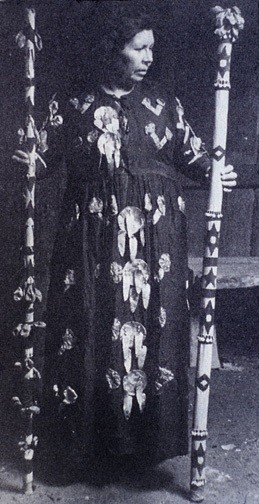Outsider poems, a mini-anthology in progress (52): Essie Parish in New York
Transcription & reconstruction by George Quasha

It is a test you have to pass.
Then you can learn to heal
with the finger, said Essie
pointing over our heads:
I went thru every test on the way,
that's how come I'm a shaman.
Be careful on the journey, they said,
the journey to heaven. They warned me.
And so I went.
Thru the rolling hills
I walked and walked,
mountains and valleys, and rolling hills,
I walked and walked and walked –
you hear many things there
in those rolling hills and valleys,
and I walked and walked and walked
and walked and walked until
I came to a footbridge,
and on the right side were a whole lot of people
and they were naked and crying out,
how'd you get over there,
we want to get over there too
but we're stuck here,
please come over here and help us cross,
the water's too deep for us –
I didn't pay no attention,
I just walked and walked and walked,
and then I heard an animal, sounded like a huge dog,
and there was a huge dog and next to him a huge lady
wearing blue clothes,
and I decided I had to walk right thru –
I did
and the dog only snarled at me.
Never go back.
I walked and walked and walked
and I came to one only tree
and I walked over to it and looked up at it
and read the message:
Go on, you're half way.
From there I felt better, a little better.
And I walked and walked and walked and walked
and I saw water, huge water
how to get thru?
I fear it’s deep. Very blue water.
But I have to go.
Put out the first foot, then the left,
never use the left hand,
and I passed thru.
Went on and on and on, and I had to enter a place
and there I had to look down:
it was hot and there were people there
and they looked tiny down there in that furnace
running around crying.
I had to enter.
You see, these tests are to teach my people
how to live.
Fire didn't burn me.
And I walked and walked and walked.
On the way you're going to suffer.
And I came to a four-way road
like a cross. Which is the right way?
I already knew.
East is the right way to go to heaven.
North, South, and West are dangerous.
And at this crossroad there was a place in the center.
North you could see beautiful things of the Earth,
hills and fields and flowers and everything beautiful
and I felt like grabbing it
but I turned away.
West was nothing but fog and damp
and I turned away.
South was dark, but there were sounds,
monsters and huge animals. And I turned away and
Eastward I walked and walked and walked
and there were flowers, on both sides of the road,
flowers and flowers and flowers
out of this world.
And there is white light, at the center,
while you are walking.
This is the complicated thing:
my mind changes.
We are the people on the Earth.
We know sorrow and knowledge and faith and talent
and everything.
Now as I was walking there
some places I feel like crying
and some places I feel like talking
and some places I feel like dancing
but I am leaving these behind for the next world.
Then when I entered into that place
I knew:
if you enter heaven
you might have to work.
This is what I saw in my vision.
I don’t have to go nowhere to see.
Visions are everywhere.
Commentary
SOURCE: George Quasha, “Somapoetics 73,” in Alcheringa, New Series Volume One, Number1, 1975.
Essie Parrish (1902-1979), a Kashia Pomo healer & Dreamer from California & the final leader, along with Mabel McKay, of the revitalized Bole Maru Dreamer religion, spoke at the New School in New York on March 14,1972. The text as given here is a reconstruction by poet/artist George Quasha of her narrative of a dream-vision, based on notes he took as she spoke; he remarks (1975) that “the greater portion of the lines are as I wrote them in the notebook. I’m just a humble scribe.” And further: “My only ‘formal’ concern was to distort her tone and overall temporal curve as little as possible. What I'm concerned with in the Essie vision is Dharma transmission. It was clear to me that, despite her sharp irony about talking to white people and the protective distance she kept, she was offering us a portion of the sacred. What would it mean to take it on (as in Yeats' ‘Did she put on his knowledge with his power ...’)? To my mind it meant getting the words and their hidden alcheringa. And that's literal enough.”
Poems and poetics